
Essex County is a county in the northeastern part of the U.S. state of Massachusetts. At the 2020 census, the total population was 809,829, making it the third-most populous county in the state, and the eightieth-most populous in the country. It is part of the Greater Boston area. The largest city in Essex County is Lynn. The county was named after the English county of Essex. It has two traditional county seats: Salem and Lawrence. Prior to the dissolution of the county government in 1999, Salem had jurisdiction over the Southern Essex District, and Lawrence had jurisdiction over the Northern Essex District, but currently these cities do not function as seats of government. However, the county and the districts remain as administrative regions recognized by various governmental agencies, which gathered vital statistics or disposed of judicial case loads under these geographic subdivisions, and are required to keep the records based on them. The county has been designated the Essex National Heritage Area by the National Park Service.

North Andover is a town in Essex County, Massachusetts, United States. At the 2020 census the population was 30,915.

Andover is a town in Essex County, Massachusetts, United States. It was settled in 1642 and incorporated in 1646. At the 2020 census, the population was 36,569. It is located 20 miles (32 km) north of Boston and 4 miles (6.4 km) south of Lawrence. Part of the town comprises the census-designated place of Andover. It is twinned with its namesake: Andover, Hampshire, England.

The Colonel John Ashley House is a historic house museum at 117 Cooper Hill Road in Sheffield, Massachusetts. Built in 1735 by a prominent local leader, it is one of the oldest houses in southern Berkshire County. The museum is owned and operated by The Trustees of Reservations, and is listed on the National Register of Historic Places.
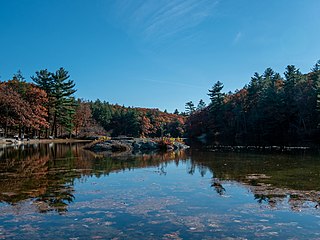
Breakheart Reservation is a public recreation area covering 652 acres (264 ha) in the towns of Saugus and Wakefield, Massachusetts. The reservation features a hardwood forest, two freshwater lakes, a winding stretch of the Saugus River, and scenic views of Boston and rural New England from rocky hilltops. The park is managed by the Massachusetts Department of Conservation and Recreation.

John Adams was an American educator noted for organizing several hundred Sunday schools. He was the 4th Principal of Phillips Academy. His life was celebrated by Dr. Oliver Wendell Holmes Sr. in his poem, "The School Boy", which was read at the centennial celebration of Phillips Academy in 1878, thus recalls him:
Uneasy lie the heads of all that rule — His most of all whose kingdom is a school.
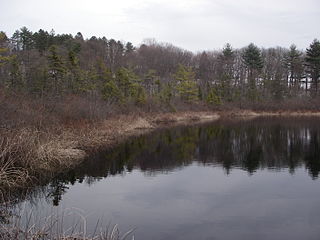
The Charles W. Ward Reservation is a 704-acre (285 ha) open space reserve located in Andover and North Andover, Massachusetts, 20 miles (32 km) north of Boston. The reserve, managed by the land conservation non-profit organization The Trustees of Reservations, is notable for its open drumlin hilltops and vistas encompassing Boston and Salem. The Ward Reservation offers 13 miles (21 km) of trails and former woods roads available for hiking, horseback riding, mountain biking, and cross country skiing; it is also a link in the 200-mile (320 km) Bay Circuit Trail system.

Greenwood Farm is a historic property and nature reserve located in Ipswich, Massachusetts, which is owned by The Trustees of Reservations. The farm is 216 acres of gardens, pastures, meadows, woodlands and salt marsh and it features the PaineHouse, a First Period farmhouse constructed in 1694.
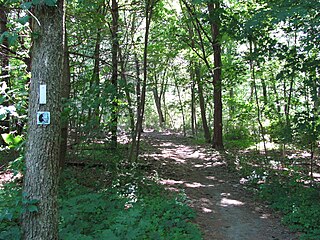
The Bay Circuit Trail and Greenway or Bay Circuit is a Massachusetts rail trail and greenway connecting the outlying suburbs of Boston from Plum Island in Newburyport to Kingston Bay in Duxbury, a distance of 200 miles (320 km).
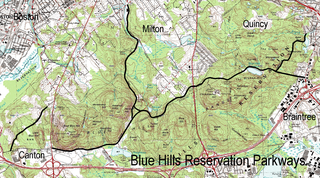
The Blue Hills Reservation Parkways are a network of historic parkways in and around the Blue Hills Reservation, a Massachusetts state park south of Boston, Massachusetts. It consists of six roadways that provide circulation within the park, and that join the park to two connecting parkways, the Blue Hills Parkway and the Furnace Brook Parkway. The roadway network was designed by Charles Eliot in the 1890s, except for Green Street, which was added to the network in the 1940s. The parkways were added to the National Register of Historic Places in 2003.
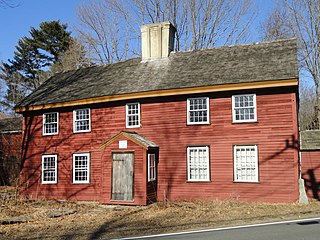
The Benjamin Abbot House or Abbot Homestead is a historic house at 9 Andover Street in Andover, Massachusetts, USA. The house was built in 1711. It was listed on the National Register of Historic Places in 1975.

The Timothy P. Bailey House is a historic house in Andover, Massachusetts. It was built by Timothy Palmer Bailey, on land purchased from his father's estate. The Baileys were successful farmers, and the younger one, who was educated at Phillips Academy, built this locally rare example of an Italianate house in 1878. The 2+1⁄2-story L-shaped house features bracketed cornices, and a main entrance porch that is elaborately balustraded and also bracketed.

The Holt-Cummings-Davis House is a historic house located in Andover, Massachusetts. It is estimated to have been built around 1700 at a location across the street, and nothing is known of its owners at the time. The first recorded owner was William Hawley, who bought it in 1803. It was purchased in 1835 by Job Abbott as a wedding present for is daughter Lucy, who married Joseph Holt. Under their ownership it was moved to its present location, and a new house was built on the old site. This house was next owned by Daniel Cummings, who married into the Holt family. In 1895 the property was bought by Augustus Davis, whose family owned it until 1935. The house itself is an unusual 1+1⁄2-story First Period house, six irregularly spaced bays wide, with a slightly off-center chimney. The house has been restored, and a large modern addition has been added to its west end.

The Capt. Timothy Johnson House is a historic late First Period house in North Andover, Massachusetts. The 2+1⁄2-story wood-frame gambrel-roofed house was built ca. 1720 by Timothy Johnson, a leading Andover resident who led Massachusetts troops in the 1745 Siege of Louisbourg. The building has a wealth of well-preserved first and second period Georgian detailing.

The West Parish Center District encompasses the social and religious center of the part of Andover, Massachusetts, that is located west of the Shawsheen River. It is mostly spread along Lowell Street on either side of a major intersection with four other roads: Shawsheen Road, Reservation Road, Beacon Street, and High Plain Road. The centerpiece of the district is the 1826 West Parish Church, which is the oldest church standing in Andover. It is an elegant Federal style granite structure topped with a wooden steeple, added in 1863. The roof is made of Spanish tile, which was probably part of changes made around 1908. Opposite the church on the south side of the common is the West Parish Cemetery, which began as a small burying ground in the 1790s, and was substantially enlarged and restyled in the early 1900s.

The Russell House is a historic house in Andover, Massachusetts.

The Abiel Stevens House is a historic First-Period house in North Andover, Massachusetts. The 2+1⁄2-story wood-frame house is unusual for retaining its basic 18th century form with minimal alteration. The house was built in 1710 by Abiel Stevens, one of Andover's early major landowners. The major alterations since Stevens built the house include a late 18th-century lean-to added to the back of the house, and the front porch, which dates to the same time.

The South Church is a Protestant Christian place of worship located in Andover, Massachusetts. It was organized as the Second Church of Andover in 1711 with Rev. Samuel Phillips as its first pastor. It is currently part of the United Church of Christ.

Samuel Phillips was an American Congregational minister and the first pastor of the South Church in Andover, Massachusetts. His son, John Phillips, was the founder of Phillips Exeter Academy, and his grandson, Samuel Phillips Jr., was the founder of Phillips Academy Andover and briefly the lieutenant governor of Massachusetts.






















